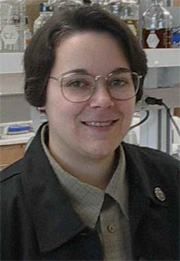The Leukemia & Lymphoma Society has chosen Christine Eischen, Ph.D., to receive a prestigious 5-year, $500,000 scholar award. The award was based on Dr. Eischen’s contributions and dedication to the field of lymphoma research.

Dr. Eischen is an assistant professor with the Eppley Institute for Research in Cancer and Allied Diseases at UNMC. The award will fund Dr. Eischen’s research grant titled, “Role of Mdm2 in Lymphoma Development,” which involves the role of cell death in lymphoma development and progression.
“When I was notified that I had been chosen to receive the award, I was thrilled and honored,” said Dr. Eischen, who’s been studying leukemia and lymphoma for almost 12 years. “I was also somewhat surprised by the news, since these awards are only given to a small select group of outstanding investigators that are typically a little more advanced in their careers and usually after multiple applications.
“Over the last several years, we have made great advances in understanding what happens inside of a cell that leads to it developing into and surviving as a tumor cell. This award really is a tribute to my mentors for teaching and supporting me in my chosen field and the dedicated people who work with me every day to push this important research forward. I am privileged to have received such an honor for my work in leukemia and lymphoma.”
Dr. Eischen said investigations reveal that the majority of human and mouse lymphomas have alterations in one or more of three genes (p53, ARF, and Mdm2), which normally cooperate to suppress tumor development.
Dr. Eischen and her colleagues’ goal are to identify the functions of Mdm2 in cell growth and death, information that can be used to improve treatments for lymphomas.
“We and others have determined that inactivation of either p53 or ARF makes cells resistant to death initiated by elevated levels of oncoproteins; consequently, resulting in lymphoma development. Although the third identified gene (Mdm2) is frequently overexpressed in lymphomas, little is known about how Mdm2 influences the development of lymphomas.”
Dr. Eishen earned her bachelor’s degree in chemistry from Creighton University in 1992 and her Ph.D. in immunology from the Mayo Clinic in 1997. She did a post-doctoral fellowship at St. Jude Children’s Research Hospital.
The Leukemia & Lymphoma Society is the world’s largest voluntary health organization dedicated to funding blood cancer research, education and patient services. The Society’s mission is to cure leukemia, lymphoma, Hodgkin’s disease and myeloma, and to improve the quality of life of patients and their families. Since its founding in 1949, the Society has provided more than $358 million for research specifically targeting blood cancers.